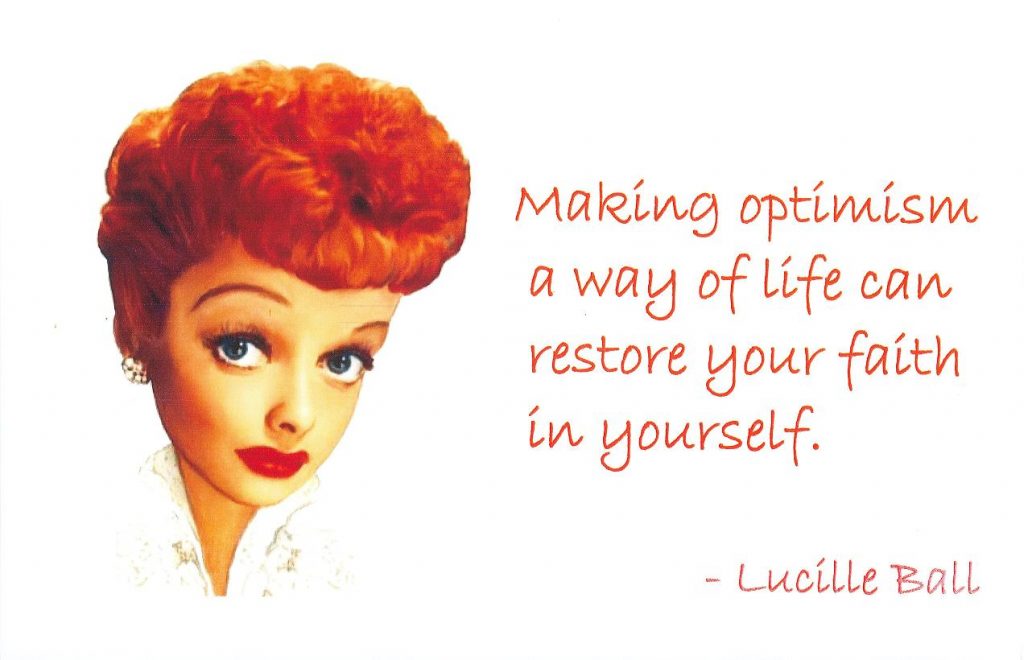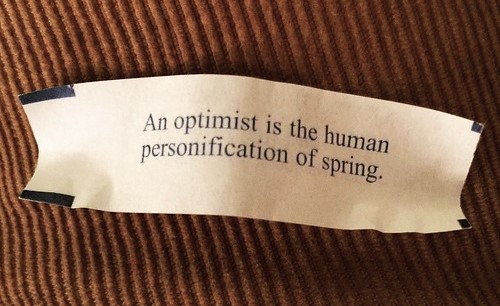That pretty much sums up an optimist’s way of life. More formally, an optimist tends to be hopeful and confident about the future or the success of something. But is optimism truly a good thing? Or is it just for suckers?

~ Robert Brault
I recently blogged about pessimism, and found that, indeed, entrepreneurial pessimists earn lots more money than optimistic ones. Pessimists tend to avoid risks, and in finances, that’s a good thing. Why? Because being overly optimistic can blind you to the costs and consequences of a situation. You can overestimate the benefits, and underestimate the costs. And you can make poor decisions because you fail to make an accurate assessment of the number and magnitude of the risks.
But Overall?
It turns out that optimism is a good thing. An optimistic attitude helps us be happier, more successful, and healthier. Optimism can protect against depression — even for people who are at risk for it. An optimistic outlook makes people more resistant to stress.
Research tells us that people who are optimistic are more committed to their goals, are more successful in achieving their goals, are more satisfied with their lives, and have better mental and physical health when compared to more pessimistic people. Optimistic people live longer.
The Bethany School in the UK published detailing The Benefits of Optimism:
1. Optimists feel healthier.
- A 2013 study of 150,000 people in 142 countries found that optimists feel healthier overall. The research shows that, if people think the world is inherently good and things will generally turn out well, they will rate their personal sense of well-being higher.
2. Optimists are healthier.
- Not only do optimists feel healthier, a study by the Harvard School of Public Heath shows that optimists really are healthier. They have fewer heart problems, better cholesterol readings, and (as another study found) lower levels of triglycerides in the blood.

“Lifestyle factors, such as regular exercise and healthy eating, accounted for less than a quarter of the optimism-lifespan association in the study, indicating that other factors may be at play.”
The Harvard Gazette
3. Optimists live longer.

~The 14th Dalai Lama
- Those feelings of well-being and improved health outcomes carry over into longevity. Researchers at the University of Pittsburgh found that optimists tend to live, on average, 11% to 15% longer than cynics. People who expect to live longer wind up actually living longer!
4. Optimists are better at fighting illness.
- Suzanne Segerstrom and Sandra Sephton demonstrated that students who received positive news were better able to fight off infection than students who were given negative news. Optimism may not miraculously cure cancer, but research shows that optimists are generally better at shrugging off illness and then recovering if they do get sick.
5. Optimists experience less stress.
- Optimists tend not to bother too much about minor mishaps and — when they do — they don’t bother as much as pessimists. Researchers at Concordia University in Quebec found that people with optimistic outlooks produce less of the stress hormone cortisol when they are in stressful situations. In addition to regulating stress better than pessimists, optimists don’t subconsciously perceive as many situations to be stressful and worthy of releasing cortisol.
6. Optimists form better relationships.
- Sanjay Srivastava at the University of Oregon found that optimists tend to have happier and longer intimate relationships. In a 2006 study, researchers found that optimists report receiving more support, encountering fewer incidences of conflict, and resolving conflict more quickly than pessimists. Even relationships between an optimist and a pessimist were happier and lasted longer than those between two pessimists.
7. Optimists enjoy working more.
- A study of 718 government employees in Kuwait found that optimistic people reported significantly higher job satisfaction and fewer psychosomatic symptoms than pessimistic people. A related study of Chinese nurses found that optimists experienced fewer conflicts at work and a better work-life balance.
8. Optimists get more job offers and promotions.
- Optimists also have an better experience when they look for jobs. Research from Duke University shows that optimistic MBA graduates found jobs more quickly and with less effort than their pessimistic peers. Employees who expect good things to happen also earn higher starting salaries and receive more frequent promotions.
9. Optimists adapt better.
- During times of change, optimists are better able to adapt to new circumstances. Incoming students at the Queensland University of Technology participated in a study showing that more optimistic students reported lower levels of stress, depression, and anxiety while transitioning from high school to university life. A study of students at three universities in Ghana found that participants who more successfully overcame obstacles also reported higher levels of optimism, among other factors. Another study in Ghana reported that optimistic students in an MBA course better adapted to changes later in their careers and displayed stronger leadership skills.
10. Optimists make better athletes.
- The University of Pennsylvania Positive Psychology Center ran an experiment on college-level varsity swim teams, adding several seconds when they told swimmers how well they had performed in timed trials. In subsequent swims, optimistic athletes responded to the negative feedback by performing even faster; pessimistic athletes swam more slowly than they had initially. In another study, collegiate soccer and basketball players who had an optimistic outlook performed significantly better even when losing than their more pessimistic teammates. Athletes of any age who display optimistic personality traits tend to be better at planning effective exercise strategies and experience lower rates of athletic burnout.
Surprise Benefits of Optimism
Happiness is a sign of high intelligence, research finds. People who are more satisfied with their life and their job score higher on tests of general mental ability.

Thich Nhat Hanh
And then there is attractiveness: research indicates that most people find optimists more socially attractive. However, people who were themselves optimists liked the other optimist even more. On the other hand, people who were pessimists were not quite as keen on the optimist, but still preferred them to the pessimist.
Optimism, as opposed to blind positivity, equips us to face our problems, recognizing the dangers and difficulties, which makes us much more likely to avoid them, and achieve a positive outcome.
So how do you spot an optimist? Jason Wachob, CEO of MindBodyGreen, and David Mezzapelle, author of Contagious Optimism, identify seven traits optimists share:
- They Express Gratitude.
- They Donate Their Time And Energy.
- They’re Interested In Others.
- They Surround Themselves With Upbeat People.
- They Don’t Listen To Naysayers.
- They Forgive Others.
- They Smile.

“To be strong so that nothing can disturb your peace of mind, to be just as enthusiastic about the success of others as you are about your own, to be too large for worry, too noble for anger, too strong for fear, and too happy to permit the presence of trouble.”
The Optimist Creed
~Jake Fratangelo
Optimists are bred, not born. Although optimism almost always starts early, it is cultivated from childhood— usually the result of having positive relationships with optimistic parents. But, as in Pretty is as pretty does, you can cultivate your own optimism by adopting the habits listed above.
You might also join an Optimist Club. Founded in 1919, Optimist International connects 80,000 members across 20 countries in local Optimist Clubs. Their mission statement: “By providing hope and positive vision, Optimists bring out the best in youth, our communities and ourselves.”
Antonyms for optimistic include dejected, depressed, doubtful, gloomy, hopeless, pessimistic, and sorrowful—and who wants that?
Bottom Line: Curb your financial risk taking but choose optimism!








